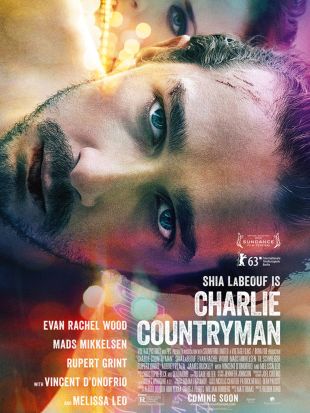Written and directed by Fredrik Bond, Charlie Countryman stars Shia LaBeouf as the title character, a young American man traveling in modern Romania. The picture opens with the hero's gruesome demise. Charlie -- his face battered and bloodied nearly beyond recognition -- dangles from a noose above a Romanian river. We see a thug ordering a beautiful young woman to blow Charlie away with a handgun. As she pumps lead into Countryman's chest, Bond uses an elderly male narrator (John Hurt, who sounds uncannily like Burgess Meredith here) to set up the ambience of a twisted contemporary fairy tale -- a feeling underscored by the cruel, circus-like, neon-lit backdrop of the opening scene. The movie then flashes back in time to relay the events that led to this horrible spectacle. We witness Charlie's mother (Melissa Leo) dying and then reappearing to him as a spirit. In postmortem form, she gives her son a random suggestion without further elaboration: Do something specific with your life by traveling to Bucharest, Romania. He heeds her orders, and soon becomes caught up in the topsy-turvy world of a beautiful and sexy Romanian cellist named Gabi Banyai (Evan Rachel Wood), recently orphaned by the death of her father. As Charlie begins to grow smitten with Gabi, he also falls into the clutches of two psychopathic Romanian drug dealers named Darko (Til Schweiger) and Nigel (Mads Mikkelsen), the latter of whom is also Gabi's ex-husband -- we recognize Nigel and Gabi from their inclusion in the opening scene.
Bond seems to want to use this tale to address lofty existential themes involving the critical importance of forging one's own path in life, the laudability of dying for love, and the relevance of self-sacrifice within the cosmos. Philosophically, the movie comes closest to a sort of Christ parable, and LaBeouf is even made up to look like Jesus with his long hair and beard. He's a martyr who will pay a heavy price for love by taking on the burden of Gabi's sins via a violent death. There may have been a way to work this sort of undercurrent into the picture, but Bond comes nowhere close to finding it: What he tries to pass off as deep and profound comes across as unforgivably pretentious and silly. If one looks beyond Bond's slick, effects-heavy direction and stylistic panache, this story is as old as Methuselah: the young man who falls hard for the princess and must rescue her from the clutches of the evil villain. The crucifixion and redemption elements may gussy up the story, but they can't disguise these centuries-old familiarities.
The film's tone is ugly as well: It indulges in brutal, sadistic, bloody violence, which it then plays for ironic laughs. When Nigel attacks Charlie, he doesn't simply punch the young man in the face or put a gun or a knife to his chest: He smashes a bottle across a counter, threatens him with the jagged glass, and implores him (with an ugly homophobic slur that cannot be reprinted here) to "Make a funny face... just like Dizzy Gillespie... puff your cheeks out." Similarly, when Charlie innocently attempts to speak with some Romanian guards, they reach out and taser him, and Bond then cuts to a close-up of the men snickering. Examples like this, of which there are dozens throughout the movie, seem designed to cue roars of laughter from the audience. Not only are these kinds of yucks unfunny, they are cruel and mean-spirited.
Perhaps even more off-putting is the overwhelming amount of merchandising present in the picture; in addition to product placement for such brands as Lay's, Ikea, and Brother, we also get "witty" little nods to the career of Robert Redford that have absolutely nothing to do with Charlie's story -- as when one cabbie mistakes him for Hubbell Gardiner and another quips, "Whoa, man, what are you, in Three Days of the Condor or something?" These allusions seem merely included to get the film a berth at Sundance, and apparently succeeded in that regard, but that doesn't mean they are pleasant for us to listen to; in fact, they seem onanistic.

The director of this picture reportedly built a remarkable career for himself as a prize-winning creator of television advertisements; that's a commendable accomplishment but not a surprising one, because the bulk of the film plays like a slick, one-concept piece of schlock, made for viewers with five-second attention spans and a craving for sensationalism. Bond may have the talent in him to become a decent director, but on the basis of this movie, he has a very, very long way to go.
